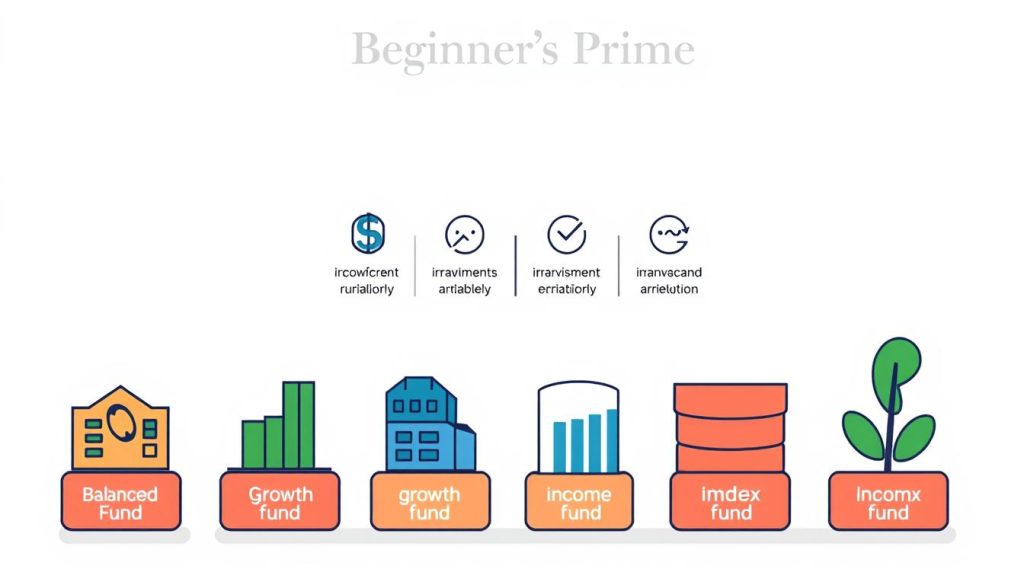Are you looking for a smart way to invest your money, but unsure where to start? Investing in mutual funds can be a great option, offering a diversified portfolio and professional management.
As a beginner, it’s natural to feel overwhelmed by the numerous investment options available. However, a beginner’s guide to mutual funds can help simplify the process. Mutual funds allow you to invest in a variety of assets, such as stocks, bonds, and commodities, with a single investment.
Key Takeaways
- Mutual funds offer a diversified investment portfolio.
- They are managed by professionals, making it easier for beginners to invest.
- A beginner’s guide to mutual funds can help simplify the investment process.
- Mutual funds allow investment in various assets with a single investment.
- They are a great option for those new to investing.
What Are Mutual Funds?
At its core, a mutual fund is a type of investment that pools money from many investors to invest in a variety of assets. This approach allows individuals to benefit from a diversified portfolio, which can help mitigate risk and potentially increase returns.
The Basic Concept of Pooled Investments
The concept of mutual funds revolves around pooling money from numerous investors to invest in a range of securities, such as stocks, bonds, and other financial instruments. By doing so, mutual funds offer a diversified investment portfolio that is managed by professional fund managers.
How Mutual Funds Work
Mutual funds work by collecting money from investors and using that capital to buy a variety of investments. The value of the mutual fund is determined by the total value of the investments it holds, which is known as the net asset value (NAV). Investors can buy or sell shares of the mutual fund at the NAV.
Key Players: Fund Managers, Investors, and Custodians
In the mutual fund ecosystem, there are several key players. Fund managers are responsible for making investment decisions on behalf of the fund. Investors provide the capital that is invested. Custodians hold the fund’s assets and ensure that transactions are settled correctly.
| Key Player | Role |
|---|---|
| Fund Managers | Make investment decisions |
| Investors | Provide capital for investment |
| Custodians | Hold and settle fund assets |
Types of Mutual Funds for Beginners
Mutual funds come in various shapes and sizes, each designed to cater to different investment goals and risk tolerances. For beginners, understanding these differences is crucial to making informed investment decisions.
Equity Funds: Growth Potential
Equity funds invest primarily in stocks, offering the potential for long-term growth. They are suitable for investors with a higher risk tolerance and a long-term investment horizon. Key characteristics include:
- Investment in stocks of various market capitalizations
- Potential for high returns over the long term
- Higher risk due to market volatility
Bond Funds: Income Generation
Bond funds invest in fixed-income securities such as government and corporate bonds. They are ideal for investors seeking regular income and lower risk. Benefits include:
- Regular income through interest payments
- Generally lower risk compared to equity funds
- Diversification within the fixed-income market
Balanced Funds: The Best of Both Worlds
Balanced funds, also known as hybrid funds, invest in a mix of stocks and bonds. They offer a balance between growth and income, making them suitable for investors seeking a moderate risk profile. Advantages include:
- Diversification across asset classes
- Potential for both income and capital appreciation
- Professional management to adjust the asset allocation
Index Funds: Low-Cost Market Exposure
Index funds track a specific market index, such as the S&P 500, to provide broad market exposure. They are known for their low costs and are a popular choice for passive investors. Key benefits include:
- Low expense ratios
- Diversification across the tracked index
- Consistent performance in line with the market
Money Market Funds: Safety First
Money market funds invest in short-term, high-quality investments and are designed to provide liquidity with a very low risk profile. They are ideal for conservative investors or those looking to park their cash temporarily.

Benefits and Risks of Investing in Mutual Funds
Understanding the pros and cons of mutual fund investing is vital to making informed decisions and achieving your financial goals. Mutual funds offer a convenient way to invest in a diversified portfolio, but like any investment, they come with their own set of advantages and disadvantages.
Advantages: Diversification, Professional Management, and Liquidity
One of the primary benefits of mutual funds is diversification, which allows you to spread your risk across various asset classes and industries. Mutual funds are also managed by experienced professionals who actively monitor the market and make informed investment decisions on your behalf. Additionally, mutual funds typically offer liquidity, allowing you to easily buy and sell shares.
- Diversification reduces risk by pooling investments across different assets.
- Professional management ensures that your investments are actively monitored.
- Liquidity provides the flexibility to quickly access your money.
Potential Drawbacks: Fees, Taxes, and Market Risk
While mutual funds offer several benefits, there are also some potential drawbacks to consider. One of the main concerns is fees, as mutual funds often charge management fees and other expenses. You may also be subject to taxes on the income earned by the fund. Furthermore, mutual funds are not immune to market risk, and their value can fluctuate based on market conditions.
- Fees can eat into your returns, reducing your overall investment performance.
- Taxes can impact your net returns, so it’s essential to consider the tax implications.
- Market risk can result in losses if the fund’s investments perform poorly.
Mutual Funds for Beginners: How to Get Started
Starting your mutual fund investment journey can seem daunting, but with a clear understanding of the steps involved, you can confidently begin your path to financial growth. Investing in mutual funds is a significant step towards securing your financial future, and as a beginner, it’s essential to understand the process from the ground up.
Step 1: Define Your Investment Goals and Timeline
Before diving into mutual fund investing, it’s crucial to define your investment goals and timeline. Are you saving for retirement, a down payment on a house, or your child’s education? Knowing your goals will help you choose the right type of mutual fund. Consider your timeline as well; longer timelines can accommodate more risk, while shorter timelines may require more conservative investments.
Step 2: Determine Your Risk Tolerance
Understanding your risk tolerance is vital in selecting mutual funds that align with your comfort level. If you’re risk-averse, you may prefer bond funds or money market funds. If you’re willing to take on more risk for potentially higher returns, equity funds might be more suitable. Consider your financial situation, investment horizon, and personal comfort with market fluctuations.

Step 3: Research and Select Suitable Funds
With your goals and risk tolerance in mind, it’s time to research and select suitable mutual funds. Look for funds with a strong track record, low fees, and a management team that aligns with your investment philosophy. Utilize online resources, financial news, and professional advice to narrow down your options. Consider factors like the fund’s investment strategy, past performance, and expense ratio.
Step 4: Open an Investment Account
Once you’ve selected a mutual fund, you need to open an investment account. This can typically be done online through the fund company’s website or through a brokerage firm. You’ll need to provide personal and financial information, fund your account, and set up any necessary automatic investments. Ensure you understand the account’s terms, including any fees associated with it.
Step 5: Make Your First Investment
With your account open, you’re ready to make your first investment. Decide on the amount you want to invest, considering your budget and investment goals. You can usually set up a one-time investment or a systematic investment plan (SIP) for regular investments. Monitor your investment periodically to ensure it remains aligned with your goals.
By following these steps, beginners can confidently start their mutual fund investment journey. Remember, investing is a long-term process, and patience, along with a well-thought-out strategy, is key to success.
Essential Tips for Successful Mutual Fund Investing
Successful mutual fund investing is not just about picking the right funds; it’s about adopting a disciplined investment approach. To help you navigate the complexities of mutual fund investing, we’ve outlined some essential tips.
Understanding Expense Ratios and Fund Fees
One of the critical factors to consider when selecting a mutual fund is its expense ratio and other associated fees. Lower fees can significantly impact your returns over time. For instance, a fund with a 0.5% expense ratio will cost less than one with a 1.5% ratio, potentially saving you hundreds or even thousands of dollars.
The Power of Dollar-Cost Averaging
Dollar-cost averaging is a strategy that involves investing a fixed amount of money at regular intervals, regardless of the market’s performance. This approach helps reduce the impact of market volatility and timing risks. It’s a disciplined way to invest that can help you avoid making emotional decisions based on market fluctuations.
Monitoring Your Investments: How Often and What to Look For
Regular monitoring of your mutual fund investments is crucial. Check your funds’ performance quarterly or semiannually, looking at factors such as the fund’s consistency, fees, and how it performs relative to its benchmark. A well-performing fund should align with your investment goals.
Common Mistakes Beginners Should Avoid
Beginners often make mistakes such as not diversifying their portfolio, investing too much in a single fund, or withdrawing during market downturns. To avoid these pitfalls, create a diversified portfolio and stick to your long-term investment plan.
Conclusion: Taking Your First Steps in Mutual Fund Investing
Now that you’ve gained a comprehensive understanding of mutual funds, it’s time to take the first step towards securing your financial future. Mutual funds for beginners offer a straightforward way to diversify your portfolio, leveraging the expertise of professional fund managers.
Understanding mutual funds for beginners is crucial in making informed decisions. By choosing mutual funds that align with your investment goals and risk tolerance, you can create a robust investment strategy. Whether you’re looking to grow your wealth through equity funds or generate income through bond funds, there’s a mutual fund suitable for you.
Choosing mutual funds for beginners involves considering factors such as expense ratios, fund performance, and the investment approach of the fund manager. By doing your research and staying informed, you can navigate the world of mutual fund investing with confidence.
As you embark on your investment journey, remember that mutual fund investing is a long-term game. Stay committed to your strategy, and with time, you’ll be on your way to achieving your financial goals.
FAQ
What are the best mutual funds for beginners?
How do I invest in mutual funds as a beginner?
What is the minimum investment required for mutual funds?
FAQ
What are the best mutual funds for beginners?
The best mutual funds for beginners are typically those with a low expense ratio, a diversified portfolio, and a clear investment objective. Some popular options include index funds, such as Vanguard 500 Index Fund, and balanced funds, like Fidelity Balanced Fund.
How do I invest in mutual funds as a beginner?
To invest in mutual funds as a beginner, start by defining your investment goals and risk tolerance. Then, research and select suitable funds, open an investment account, and make your first investment. You can invest through a brokerage firm, a mutual fund company, or a robo-advisor.
What is the minimum investment required for mutual funds?
The minimum investment required for mutual funds varies depending on the fund and the investment platform. Some mutual funds have a minimum investment requirement of
FAQ
What are the best mutual funds for beginners?
The best mutual funds for beginners are typically those with a low expense ratio, a diversified portfolio, and a clear investment objective. Some popular options include index funds, such as Vanguard 500 Index Fund, and balanced funds, like Fidelity Balanced Fund.
How do I invest in mutual funds as a beginner?
To invest in mutual funds as a beginner, start by defining your investment goals and risk tolerance. Then, research and select suitable funds, open an investment account, and make your first investment. You can invest through a brokerage firm, a mutual fund company, or a robo-advisor.
What is the minimum investment required for mutual funds?
The minimum investment required for mutual funds varies depending on the fund and the investment platform. Some mutual funds have a minimum investment requirement of $1,000 or more, while others may have no minimum or a lower minimum, such as $100.
Are mutual funds a good investment option for beginners?
Yes, mutual funds can be a good investment option for beginners. They offer diversification, professional management, and liquidity, making them a great way to start investing. Additionally, mutual funds provide a way to invest in a variety of assets, such as stocks, bonds, and commodities, with a single investment.
How do I choose the right mutual fund for my investment goals?
To choose the right mutual fund for your investment goals, consider your risk tolerance, investment horizon, and financial objectives. Research the fund’s investment objective, fees, and performance history to ensure it aligns with your goals. You can also consult with a financial advisor or use online tools to help you make an informed decision.
What are the fees associated with mutual fund investing?
Mutual funds charge various fees, including management fees, administrative fees, and distribution fees. These fees can eat into your returns, so it’s essential to understand the fees associated with a particular fund before investing. Look for funds with low expense ratios, as they can help you save on fees.
Can I withdraw my money from a mutual fund at any time?
Yes, you can typically withdraw your money from a mutual fund at any time, although some funds may have restrictions or penalties for early withdrawals. It’s essential to review the fund’s prospectus and understand the withdrawal rules before investing.
How do I monitor my mutual fund investments?
To monitor your mutual fund investments, regularly review your account statements, check the fund’s performance, and rebalance your portfolio as needed. You can also use online tools and resources to track your investments and stay informed about market developments.
,000 or more, while others may have no minimum or a lower minimum, such as 0.
Are mutual funds a good investment option for beginners?
Yes, mutual funds can be a good investment option for beginners. They offer diversification, professional management, and liquidity, making them a great way to start investing. Additionally, mutual funds provide a way to invest in a variety of assets, such as stocks, bonds, and commodities, with a single investment.
How do I choose the right mutual fund for my investment goals?
To choose the right mutual fund for your investment goals, consider your risk tolerance, investment horizon, and financial objectives. Research the fund’s investment objective, fees, and performance history to ensure it aligns with your goals. You can also consult with a financial advisor or use online tools to help you make an informed decision.
What are the fees associated with mutual fund investing?
Mutual funds charge various fees, including management fees, administrative fees, and distribution fees. These fees can eat into your returns, so it’s essential to understand the fees associated with a particular fund before investing. Look for funds with low expense ratios, as they can help you save on fees.
Can I withdraw my money from a mutual fund at any time?
Yes, you can typically withdraw your money from a mutual fund at any time, although some funds may have restrictions or penalties for early withdrawals. It’s essential to review the fund’s prospectus and understand the withdrawal rules before investing.
How do I monitor my mutual fund investments?
To monitor your mutual fund investments, regularly review your account statements, check the fund’s performance, and rebalance your portfolio as needed. You can also use online tools and resources to track your investments and stay informed about market developments.

Leave a Reply